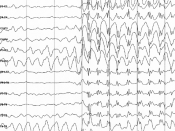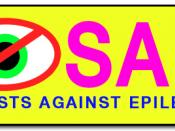Having a seizure might be some thing that people jokingly say to their friends, but there are 50 million people world wide that suffer from epilepsy, which is the tendency to have repeated seizures that originate in the brain. What happens in the brain to cause a seizure? During an epileptic seizure, a breakdown occurs in the systems that maintain the balance of electrical activity in the brain, resulting in abnormal electrical discharges in the brain. During most seizures, a group of abnormal cells causes changes in neighboring cells, activating the entire group of cells at once. This linkage of electrical discharges creates a "storm" of electrical activity in the brain.
There are many reasons why a person might develop epilepsy. Hereditary plays a big part. The chances that a child of a parent with epilepsy will have unprovoked seizures by age 25 is 6 percent. Epilepsy is roughly twice as common among the children of women with epilepsy than among the children of men with epilepsy.
If a family member has epilepsy, the chances of a person developing partial epilepsy after a head trauma are more likely as well. In addition, it is possible to develop epilepsy without having anyone in your family be afflicted by it. People who are at risk include multiple sclerosis patients, persons who have head a head injury or many head injuries and have been unconscious for prolonged periods of time, infants with seizures within the early days of its life, and also people who use illegal drugs or use alcohol profusely.
People who have had one seizure do not necessarily suffer from epilepsy. The risk of having another seizure after the first one, however, is fifty percent. If someone has had two seizures, the chances of a third are at eighty percent.

